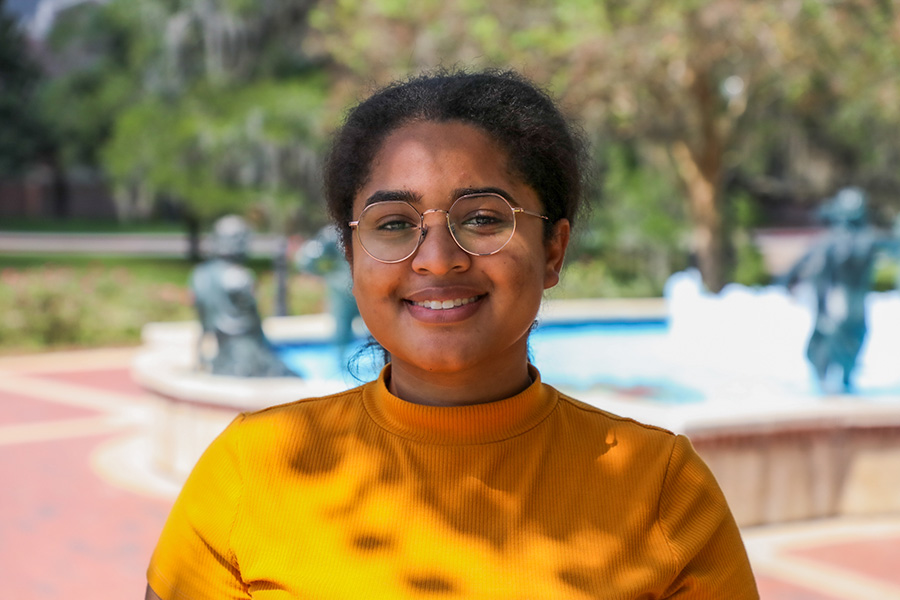Student Spotlight: Illeana Sanders

Illeana Sanders is an undergraduate pursuing a bachelor’s degree in classical archaeology through Florida State University’s Department of Classics, part of the College of Arts and Sciences. Sanders is a 2020 Center for Academic Retention and Enhancement student, and she is also incoming president of the student archaeology club. Additionally, Sanders is a member of the classics honor society, Eta Sigma Phi, for which she attended the 93rd National Classics Honors Convention in April as a chapter representative for FSU. Sanders also earned the Society for American Archaeology Historically Underrepresented Groups scholarship to attend the Cetamura del Chianti archaeological field school in Tuscany, Italy, over this past summer.
What year are you in school, and when do you expect to graduate?
I am a third-year student, and I expect to graduate in May 2024.
Tell us a little about your background, where you’re from and what brought you to FSU.
I am from Jacksonville, Florida, and I am a first-generation college student. FSU is one of the few Florida universities to offer classical archaeology as a major, which made it my number one choice for an in-state college.
What inspired you to pursue a degree in classics?
My uncle was interested in classics and Roman mythology during his high school year, and as a child, I read the same classics literature he had studied. The ancient Greek and Roman societies fascinated me. By age 10, I knew I wanted to pursue a career in classics, but I did not find my passion for archaeology until I was 15, when my family and I went on a trip to Washington D.C. At the ancient Egypt exhibit at the Smithsonian Natural History Museum, I remember seeing a staff member doing conservation work on an artifact in a small room with glass walls. The conservationist’s delicate work amazed me, and I fell into a rabbit hole of research into archaeology careers.
What do you want the public to know about your studies? Why are your topics important?
My interest is in protecting cultural artifacts from illegal acquisition and restoration. This is important because there are many objects that are illegally purchased and stolen from archaeological sites and institutions. It is important to return these items to their original home so that people may learn from and share in their cultural significance. We can learn so much about human history from even a single artifact.
Tell me about your experience attending the National Classics Honors Convention in April. How has being in Eta Sigma Phi enhanced your time at FSU?
Attending the 93rd National Classics Honors Convention was a truly honor. I was able to connect with other students from many universities around the country through a shared love of classics. I, along with five other members from Eta Sigma Phi attended the convention, virtually representing Florida State University. I learned about the various chapters' activities at other universities and how we could incorporate those ideas into our work at FSU. We also attended lectures from professors presenting a range of topics. Eta Sigma Phi has allowed me to meet new people with similar career interests, and the organization is a wonderful community of students creating a home for people with a love for the classics. What aspect of your areas of study do you find most fascinating? I am most fascinated by the emergence of cultural heritage law and how it can help protect artifacts, archaeological sites and archaeologists. Cultural heritage law, or cultural property law, is the protection and regulation of important cultural materials like ancient artifacts, historical landmarks, artwork and intangible cultural property. I’ve taken a few courses in the Department of Classics on this subject and conducted research into looted artifacts. I found legal issues that arose in those cultural heritage cases. I want to make a legal impact because protecting cultural heritage is important.
What are some current goals or projects that you’re working on?
Currently, I am applying to conduct Honors in the Major research. If accepted, my research will focus on the rise of artifact sales on popular social media sites and apps like Facebook and WhatsApp. The COVID-19 pandemic led to an increase in artifacts being illegally acquired and sold anonymously on social media through individual posts or community groups. Unfortunately, this recent phenomenon is not regulated by the platforms. I anticipate my research will inform people about the growing issue of trafficking artifacts on social media.
What on-campus resources have helped you achieve success?
As a 2020 Center for Academic Retention and Enhancement student, my fellow program members have become family to me. CARE provided me with information about the FSU Career Center, financial management resources and academic resources. Without CARE, I may have never known about the various on-campus resources that FSU offers to students. I frequently use the university libraries by contacting the classics digital scholarship librarian, Matt Hunter, for assistance in finding resources for difficult research topics.
Are there any faculty or staff who have helped or inspired you? Why/ how so?
Assistant professor of classics Elizabeth Murphy and distinguished research professor of classics Nancy de Grummond are two faculty members who assist me with my research. Both professors are inspirational to my studies, and they have provided me with knowledge that will further my career in archaeology. They’ve also given me tips on what to expect in graduate school and how to navigate it.
Following your graduation, what are your plans? Even though you might miss FSU, what are you looking forward to once you graduate?
After graduation, I plan on applying for graduate school to pursue a master’s degree in archaeology. Afterward, I want to attend law school to pursue a degree in cultural heritage law. I’m looking forward to learning more about protecting cultural heritage, and hopefully I’m able to start my career in the next few years!
